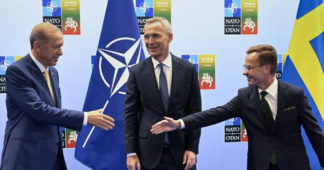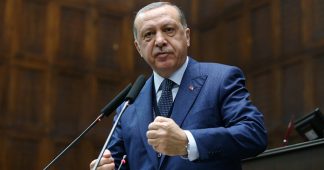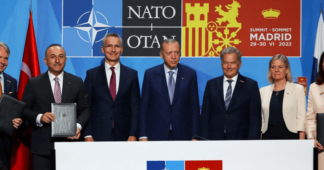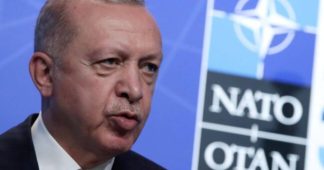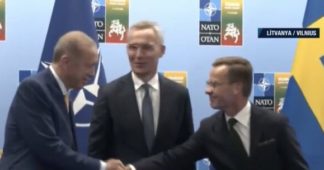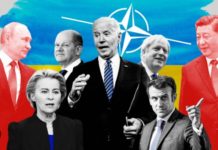By Selim Koru
Jul 31, 2023
NATO’s Vilnius summit appears to have gone well. To the delight of allies, Turkish President Recep Tayyip Erdogan came out announcing that he would take Sweden’s membership application to parliament and support its ratification. Sweden’s accession probably won’t hit parliament’s floor for months in Ankara, but the announcement still triggered an all-too-familiar media frenzy. “Erdogan’s Flip On Sweden Signals Mending ties with the U.S.,” ran a New York Times news analysis. “Turkey’s Reversal on Sweden’s NATO bid boosts alliance unity,” said Bloomberg. It seemed Turkey was finally distancing itself from Russia and steering back towards the West.
If nothing else, recent history has shown that this is a very seductive story. Observers speculated that Turkey might “return to the West” after the Gaza Crisis in 2010, the Arab Spring in 2011, a flare-up in Iranian-Turkish rivalry in 2011, the rise of the Islamic State in 2015 and the assassination of Russia’s ambassador to Turkey in 2017. They also got hopeful when Erdogan won re-election in 2018, lost municipal elections in 2019 and was re-elected again in May of this year, not to mention when U.S. President Joe Biden won the U.S. presidency in 2020. Conversely, it was just a matter of time until the “bromance” between Erdogan and Russian President Vladimir Putin would give way to “frenemy” status. The Russian-Turkish relationship, after all, was not shaped by “ideological convictions” but by geopolitical realities, which would eventually push Turkey back toward its NATO allies. Economic rationale, too, is sometimes said to be pushing Turkey westwards, with the caveat that it is also engaged in a “balancing act” with Russia, Turkey’s biggest supplier of energy. Perhaps the biggest moment of hope, however, came after the full-scale Russian invasion of Ukraine in February 2022. Now, surely, Turkey would return to the West’s embrace. The Bayraktar drones pounding Russian armor were proof.
Why do so many analysts remain so eternally optimistic? Let’s call it the prodigal son fallacy. This is the belief that while Turkey has been “pivoting,” “drifting,” or “shifting axis” away from the West, it will at some point return — hat in hand — to the NATO fold. Perhaps this faith is a natural outgrowth of the perennial obsession with “who lost Turkey?” — an older and richer genre where Western, often American, writers wonder who is to blame for their child’s betrayal. The prodigal son fallacy takes the next step, assuming that Turkey has been lost, but, as in the parable, will be found again. It is, however, a bit more insidious, in that the underlying assumptions are never acknowledged. Maybe no one wants to be explicit about the hierarchical relationship between the rich father and wayward son.
The prodigal son fallacy is based on an old idea of Ottoman-Turkish geopolitics. Turkey, it assumes, is hopelessly outclassed by Russia, its much larger, richer and more ambitious neighbor to the north, which happens to have had designs on Ottoman and Turkish territory. To defend itself, Turkey has for centuries allied with Western powers. Erdogan’s close relationship with Putin and corresponding strains with the West are, therefore, an anomaly in the wider sweep of history. Eventually, the laws of geopolitics will reassert themselves, and the age-old alliance structure will snap back into place. This belief has become intrinsic to the journalistic and analytical communities, which as a result expect this snapback after every major news event.
But the prodigal son analogy is out of touch with the political reality of our times. It is indicative of the mindset that made people skeptical that Russia would invade Ukraine and surprised, when it happened, that the non-Western world didn’t see the invasion as a clean-cut contest between good and evil. What this mindset misses is that, while geopolitical calculus is important, countries have different political cultures and thus perceive the calculus in different ways. Today, Turkey’s goal is not to balance against Russia. It’s to be distinct, and ultimately independent, from its Western allies. From this starting point, Erdogan’s calculations make more sense and Turkey’s return appears much less likely.
The Prodigal Son Stays Prodigal
Fundamentally, the prodigal son fallacy relies on a number of assumptions, none of which fit with Erdogan’s handling of Sweden’s NATO accession over the last two years.
Turnings the Tables on Sweden
First, many accounts have suggested, implicitly or explicitly, that Turkey is holding up the process for fabricated reasons at Putin’s behest. We can’t really know whether Erdogan and Putin explicitly talked about NATO expansion. But if they did, surely Finland, which has a 1,340-kilometer (834-mile) long border with Russia, would have been the more significant country. Turkey, of course, green-lit Finland, then held up Sweden.
Why? There is a real rationale for Erdogan’s stance on Sweden, but it’s about turning the tables on the West, rather than advancing the specific security agenda Turkish diplomats have touted. Sweden certainly has a politically active Kurdish diaspora, many of whom support the Kurdistan Workers’ Party. It would be very difficult to argue, however, that cracking down on them, as Ankara has demanded, would actually change things for Turkey’s security. The party hasn’t staged attacks in Turkey’s major cities and, since 2015, the Turkish military has been putting pressure on it beyond the country’s southern border.
Turkey’s bigger problem is that the leftist-Kurdish diaspora is amply represented across Europe and becoming prominent in the politics of countries like Germany and the Netherlands. There is a serious chance, for example, that the outgoing Dutch prime minister might be replaced by Justice Minister Dilan Yeşilgöz, who has roots in the Kurdish province of Dersim. Ankara is alarmed that this will only intensify the spread of anti-Turkish attitudes across the continent, but pressure on Sweden cannot change this. It is more likely to backfire. Most European countries are already NATO allies and Turkey lacks the leverage to make them crack down on their Kurdistan Workers’ Party sympathizers. Through its stand against Sweden, Ankara seems to have only strengthened European resolve to oppose Turkish influence on the continent.
Erdogan’s policy, however, makes sense on a different level. For decades, the West, and especially Europe, has played the role of standard-setter in Turkey, approving or condemning events in the country according to its broadly liberal-democratic principles. The talk was of “carrots and sticks,” an analogy that comes from taming donkeys. The European Union’s annual report, in which it evaluates the country, was almost universally referred to as a “report card.”
Against this backdrop, Erdogan’s political project aspires to turn the East-West relationship upside-down. In other words, he wants Turkey to set standards for Western countries, judge them on the execution, and reward or punish them accordingly. Sweden’s application to NATO was just such an opportunity. Anyone following the narrative in Turkey understood that it was now Turkey’s turn to wave the stick and dangle the carrot, and for Stockholm to act more like Ankara. Hilal Kaplan, a senior journalist who accompanied Erdogan to Madrid in 2022, wrote then that “two powerful European countries like Sweden and Finland have agreed to adjust their terrorism laws in a way that will please Turkey.” The European Union had once tried to make Turkey change its anti-terror laws, but today the shoe was on the other foot. “Now we are going to set up a Permanent Joint Mechanism between the three countries to evaluate the changes they are going to make to their terrorism laws, their extradition of terrorists, as well as whether they will continue their informal support to terrorists.”
Sweden tried to play along and make the right noises, but only to a point. It reformed its anti-terror laws in a way that made life a little more difficult for supporters of the Kurdistan Workers’ Party. But Turkey wanted to see execution and particularly, it seems, Turkish-style crackdowns on street protests, which Sweden wasn’t prepared to do. That is also why the Quran burning became a sticking point. The Madrid agreement didn’t exactly stipulate that the two European countries wouldn’t allow the desecration of holy texts on their territories, but Erdogan probably felt that it was a symbol of Sweden’s insincerity in the whole roleplay.
Erdogan yielded to the NATO allies in Vilnius because neither the carrot nor the stick really belonged to him. Whatever NATO was, is, and will be, it is an extension of American power. Like other institutions set up after World War II, its member states are nominally equal and hence have rights like veto powers. At the end of the day, however, the United States leads the alliance and determines its direction. At a time when Russia is looking weaker and alliance unity is high, Erdogan must have calculated that pushing the roleplay past Vilnius would have aggravated the allies too much.
Ironically, when Erdogan’s softer stance at Vilnius triggered prodigal son takes, many in Turkey’s government media seemed annoyed. Melih Altınok, a columnist at the English-language Daily Sabah, wrote that these accusations were unfounded. Turkey wasn’t distancing itself from Russia and approaching NATO, he said, it was an axis of its own. NATO was approaching Turkey, not the other way around.
What Erdogan Wants from the West
Prodigal son proponents may point to Erdogan’s obvious eagerness to meet with Biden at the NATO summit. Erdogan does indeed covet these meetings and his media channels at home feature them prominently. Doesn’t that mean he wants better ties with the West?
It’s not that simple. Ideally, Erdogan would like to get the kind of treatment that India’s Narendra Modi — also far from a perfect democrat — got during his full state visit at the White House in June: the red carpet, culturally appropriate food, lavish praise. Erdogan would be recognized as the leader of the Islamic world and be allowed to build connections with American Muslims. Back home, he would like the United States to stop working with the Kurdistan Workers’ Party in Syria, let him throw his weight around the Mediterranean, stop talking about democracy, and, crucially, allow technology transfers to the budding Turkish defense industry.
Such treatment, Erdogan and his surrogates would have Americans believe, might just stop Turkey’s “drift” from the West. It probably wouldn’t, though, and in any case, we’re unlikely to find out. The American policy elite don’t seem impressed by Erdogan’s Turkey, and won’t grant it the distinctiveness it craves. In their eyes, Turkey will remain the son in the parable, and he didn’t send home a list of demands.
Pragmatic Ideologue, Ideological Pragmatist
Finally, commentators hoping for Turkey’s return have often tried to understand Erdogan on a binary between “ideological” and “rational/pragmatic.” For them, ideology implies Iranian-style revolution, while rationality or pragmatism implies cooperation with the West, if not a full prodigal son-type return. But this is deeply misleading. Countries can be very rational about pursuing goals that others might view as ideological, or even radical. If one reasons from the tenets of Turkish nationalism as they exist today, the greatest threat to Turkey’s sovereignty isn’t Russia, it’s the West. In order to diffuse that threat, Turkey needs to develop the capabilities to stand on its own, broaden its global footprint and soothe American concerns over an unruly ally — until, one day, it can stand on its own two feet.
In terms of his worldview, Erdogan is existentially and ferociously opposed to Western geopolitical dominance. He has been since his youth and this forms the very heart of the regime he has set up. That is why he wants to gradually find alternatives to Turkey’s dependencies on Western markets and technology. Erdogan has all but given up courting European money and is making frequent trips to the Gulf, putting up bigger and bigger chunks of the country for sale. In terms of defense, Turkey is weary of stealthy sanctions from its own treaty allies. Ankara claims to be tracking the “local and national ratio” of its defense industry, which it says is now above 80 percent. Wherever Turkish firms can, they will still partner with Western companies, but only if they get know-how in return. In the long run, it is Turkey’s policy to be entirely self-sufficient in its defense needs. “Bad neighbors have made us into homeowners,” Erdogan likes to say. His policy isn’t to build up long-term trust in the West — it’s gradual decoupling so that future generations of Turkish leaders don’t need Western trust.
What counts as pragmatism changes dramatically when you accept that Turkey’s new ruling class believes that, as part of a July 2016 coup attempt, Washington essentially sent a kill squad after Erdogan. This view is ubiquitous in state-funded media and was endorsed by the former interior minister. July 15 is now a national holiday in Turkey and a time to commemorate the country’s victory against the Gulenists, a religious cult whose leader is based in Pennsylvania. Against this backdrop, one would have to assume that Turkey’s elite is deeply irrational to plan its future in an American-led alliance.
These views are not restricted to Erdogan supporters. In fact, it was an opposition politician who best explained where pragmatism would take you if you really believed that NATO was a threat. Ümit Özdağ, the leader of the nativist Victory Party, has said that Turkey needs to remain in NATO for the time being because the only other option is being its enemy:
“If Turkey left NATO today, it would become its target … our chance of taking back the islands under Greek occupation in the Aegean would disappear … Turkey would be in the position of an occupier in Cyprus, the Greek part of the island would enter NATO. In summary, remaining within NATO now is a security strategy for Turkey … without deep-rooted change under objective conditions, saying ‘let’s leave NATO,’ politically, is nothing but drivel.”
Özdağ is known for having long-running and close connections to Turkey’s military and intelligence circles. Erdogan’s retinue would never endorse these comments. But then again, if they agreed, this would be the most rational response.
Dreaming of Regime Change
American diplomats seem dumbstruck by the scale of Turkey’s demands and its conduct. They probably hoped that the election this past May would bring an end to them. Biden certainly did. In a New York Times interview during his 2020 presidential campaign, Biden said that he would support the opposition to oust Erdogan, “not by a coup, not by a coup, but by the electoral process.” He didn’t seem to realize that saying the c-word twice — even in the negative — triggered Turkish threat responses across the political spectrum. Once in office, Biden mostly ignored the Turkish president, presumably hoping that he would be replaced. He wasn’t. And the opposition, having crashed on the shoals of Erdogan’s nationalism, is now splintering into a thousand pieces. Erdogan will likely end his career undefeated and the regime he has built has a strong chance of survival. Its elites may now be wondering if the game of regime change can be turned upside-down.
At the meeting between the two presidents in Vilnius, Biden started off welcoming Erdogan and praising him for lifting his veto on Sweden the day before. Erdogan skipped the NATO stuff, and the first thing he said was, “Thank you for calling me upon my re-election to my position, and thank you for your congratulatory messages on behalf of the nation and myself.” After this dig at Biden over his New York Times remarks, Erdogan then said that their meeting “on the margins of NATO” was only a beginning, implying that he expected to get much more attention from now on.
“Of course for me, this process is a 5-year process,” Erdogan then said, flashing a smile, “With you, there are now preparations for elections. And on these elections, I would like to take the opportunity to wish you the best of luck.” The smile was now a huge, full-faced grin. “Thank you very much,” Biden said, “I look forward to being with you in the next five years.”
That, everyone in that room probably knew, is far from assured. Recent reporting suggests that Donald Trump’s candidacy is picking up pace and that if he wins he will be far more systematic and aggressive about breaking up the American foreign policy establishment. No wonder Erdogan was smiling, prodigal and proud.
We remind our readers that publication of articles on our site does not mean that we agree with what is written. Our policy is to publish anything which we consider of interest, so as to assist our readers in forming their opinions. Sometimes we even publish articles with which we totally disagree, since we believe it is important for our readers to be informed on as wide a spectrum of views as possible.
